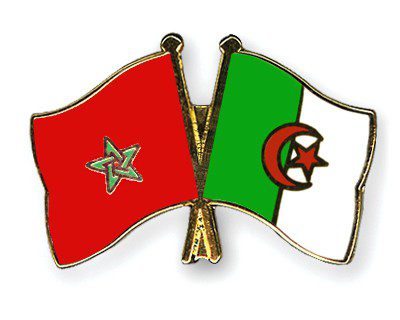Despite the unilateral move by the Algerian government to break diplomatic relations between the two countries, Morocco still expresses its willingness to remain “a credible and loyal partner for the Algerian people.”
Rabat takes note of the unilateral decision of the Algerian authorities to sever diplomatic relations with Morocco, the Moroccan Ministry of Foreign Affairs announced on Tuesday evening in a statement.
“Morocco regrets this decision, which is completely unjustified but expected, given the logic of escalation noted in recent weeks, as well as its impact on the Algerian people,” the same statement said.
“The Kingdom of Morocco will remain a credible and loyal partner for the Algerian people and will continue to act, with wisdom and responsibility, for the development of healthy and fruitful inter-Maghreb relations,” the ministry added.
A few hours earlier, Algeria’s chief diplomat, reading a statement of the Algerian head of state at a press conference, said that his government had decided to break diplomatic relations with the Kingdom of Morocco from this day on,” because of what he presented as “hostile actions” of the Kingdom towards his country.
Ramtane Lamamra explained the reasons for this decision by saying that “history had shown that the Kingdom of Morocco has never ceased to carry out hostile actions against Algeria.
The other grievances advanced by Algiers against Rabat, are the recent statements of the Israeli Minister of Foreign Affairs during his visit to Morocco. “This is the first time since 1948 that an Israeli official has made such statements about Algeria,” according to the Algerian Foreign Minister.
The text also cites the alleged support provided by Morocco to the Movement for the Self-Determination of Kabylie (MAK) whose leadership lives in exile, mainly in France, and Rachad (a group of Algerian conservative Islamists based in London), two organizations classified as terrorist by Algiers.
Ramtane Lamamra also recalled the accusations made by some Western organizations against Morocco suspected of having used an Israeli spying software “Pegasus” that would have targeted several Algerian officials, as well as past incidents, such as the desecration of the national flag at the consulate in Casablanca in 2013. These accusations are disputed by independent international experts which have prompted Rabat to file complaints in several European courts, including France, Spain and Germany.
The Algerian minister also put “the responsibility for the repeated crises, which have worsened ever since,” on the Kingdom’s leaders, an attitude that, according to him, “leads to conflict instead of integration in the Maghreb region.”
“In any case, Algeria refuses the logic of the fait accompli,” Mr. Lamamra said.
The Algerian presidency had announced, on August 18, it was considering a “review” of its relations with Rabat, accusing Morocco of being involved in the deadly fires that ravaged the north of the country and killed at least 90 people. An attitude that surprises both in Morocco and in Algeria itself, where it was widely received as unfounded.
This declaration by the head of Algerian diplomacy also comes at a time when signs of a deterioration in relations between the two countries have been accumulating in recent weeks. A month ago, Algiers recalled its ambassador to Rabat for “consultations with immediate effect,” following diplomatic tensions.
In his Speech of the Throne on July 30, King Mohammed VI had, however, expressed his “sincere commitment to keeping the hand outstretched to work together and without conditions, to establish bilateral relations based on trust, dialogue and good neighborliness.”
The King of Morocco had also called for the reopening of land borders with Algeria. “You will never have to fear malice on the part of Morocco. The security and stability of Algeria and the peace of its people are organically linked to the security and stability of Morocco,” he then said.
The King had also invited the Algerian leader Abdelmadjid Tebboune “to promote wisdom” and “work in unison to develop relations” between the two countries. The Monarch had even described the two countries as “twins who complement each other.”
The borders between Morocco and Algeria have been closed since 1994 at the initiative of Algeria. Algiers had taken such a decision following the imposition by Rabat of an entry visa to its territory to Algerian citizens. At the time, Morocco suspected that some of its neighbor’s security services were behind a bloody attack that rocked Marrakech. In 2004, visas were abolished and airlines between the two countries were re-established, but Algeria has continued to refuse to reopen its land borders ever since, despite repeated calls from Morocco, friendly countries and the people of both States.
Relations between the two neighbors have been particularly strained for more than 40 years over the Sahara issue. Algeria supports, finances and arms the Polisario Front, which is fighting for the independence of this former Spanish colony. Morocco, which controls most of the territory and whose sovereignty over the region is recognized by most foreign governments, including the United States, is proposing an autonomy plan under Moroccan sovereignty.
Very recently, in mid-July, these bilateral relations were marked by a new outburst of tension. The Moroccan ambassador to the UN had publicly expressed his support for the principle of “self-determination” of the Kabyle people in Algeria, in reaction to the latter’s support for the Polisario Front. Algiers had immediately responded by recalling its ambassador to Rabat for consultations.
HA/Los/fss/abj/APA


